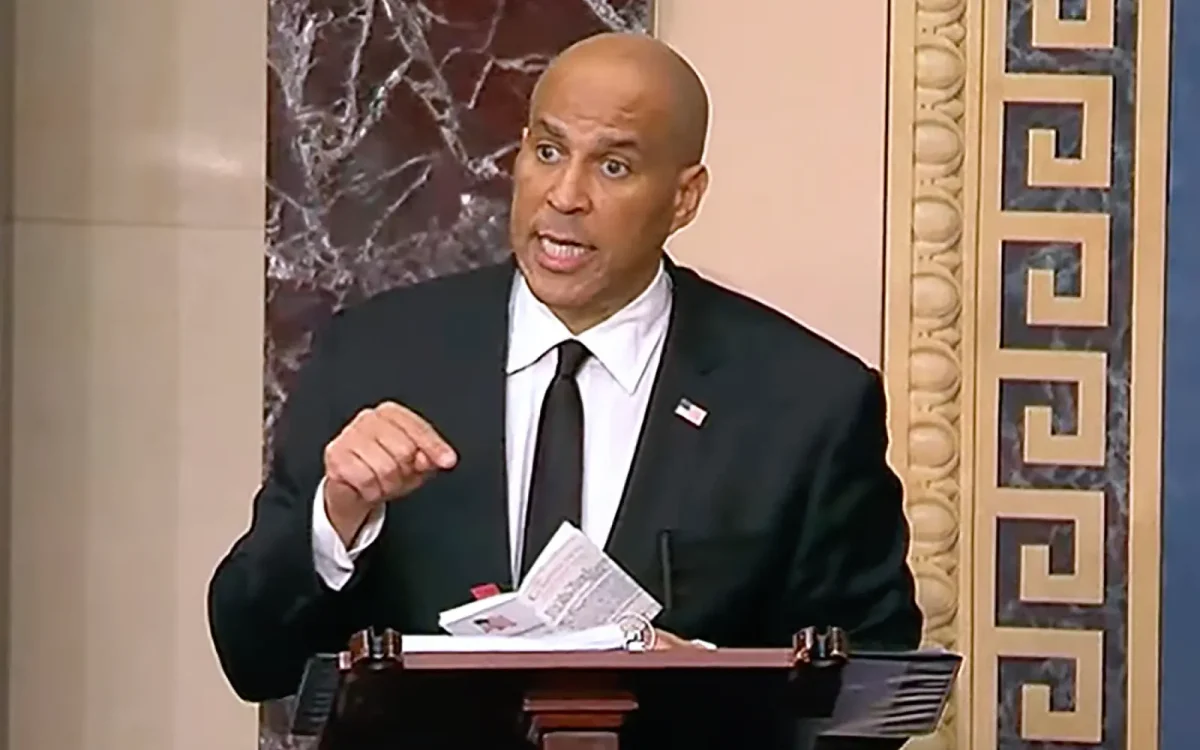In a record-breaking speech that began on March 31 at 7 p.m. and concluded at 8:05 p.m. on April 1, Senator Cory Booker spoke for 25 hours and five minutes on the Senate floor. This surpassed the previous record of 24 hours and 18 minutes held by Senator Strom Thurmond since 1957. Booker’s marathon address delivered critiques of the Trump Administration and the Department of Government Efficiency (DOGE), which is currently overseen by Elon Musk.
A member of the Democratic Party, the New Jersey senator’s remarks touched on a wide spectrum of political issues, including healthcare access, civil liberties, economic inequality and partisan polarization. His speech was widely viewed as a response to growing concerns over the erosion of democratic norms and the weakening of governmental accountability under the current administration.
The DOGE, created by executive order in Jan 2025, has faced rising criticism for its sweeping authority over federal agencies. Under Musk’s leadership, the agency has introduced controversial measures that bypass traditional legislative processes. Booker accused the DOGE of operating without transparency or constitutional oversight, alleging that the agency’s actions reflected “lawlessness” and undermined core principles of constitutional governance.
Booker framed his speech as a response to what he described as a dangerous political moment in the country’s history. “These are not normal times in America, and they should not be treated as such,” he said. “The threats to American people and American democracy are grave and urgent, and we all must do more.” He warned that democracy, decency and equal protection are under attack.
Booker repeatedly referenced civil rights activist and politician John Lewis, invoking his words to justify his decision to hold the floor. “Get in good trouble, necessary trouble, help redeem the soul of America,” he said. He also cited, “If it is to be, it is up to me,” emphasizing individual responsibility during moments of democratic crisis.
A substantial portion of his address was dedicated to defending Medicaid and Medicare against Republican-led efforts to slash funding. “It is not a government program—it’s a commitment we make to each other,” he said. He argued that the proposed cuts would harm veterans, seniors, children, disabled individuals and low-income families while enriching the wealthy. He said that the cuts were “not going to cut the deficit” but meant “to take from the poor and give it to the rich and powerful.”
Booker acknowledged the flaws of both political parties but insisted this was a time for unified moral resistance, not partisanship. “No side has a monopoly on the truth. No side has been perfect servants of this country,” he said. He emphasized that the urgency of the moment transcended political affiliation. To humanize the stakes, Booker read aloud letters and emails from Americans facing the consequences of healthcare cuts. These included a veteran with mental illness, a special education teacher and a parent of a disabled daughter. “Americans telling me their most vulnerable pains, their most terrified realities,” he said, holding up handwritten letters sent to his office.
Booker criticized the Trump administration for doing away with essential services to fund tax breaks for the wealthy. “This is a deliberate and calculated attack on healthcare for Americans in order to give tax cuts to the wealthy,” he said. He denounced the administration’s moves as prioritizing wealth accumulation over public well-being.
He briefly touched on threats to public education, environmental protections and freedom of the press. Booker criticized the silencing of university dissent and restrictions on academic freedom, calling them attacks on foundational democratic values.
Concluding his speech, Booker framed his actions as part of a larger historical arc of moral resistance, drawing parallels to abolitionists, suffragists and civil rights activists. “Good people who caused good trouble in the face of slavery… in the cause of equal rights… in the fight against hate,” he said.
His speech quickly gained traction online, drawing over 300,000 concurrent viewers across YouTube, TikTok and Instagram Live.
The length and symbolism of Booker’s address drew comparisons to historic congressional speeches, most notably Strom Thurmond’s 1957 filibuster against the Civil Rights Act. While Thurmond’s speech is remembered as obstructionist, Booker’s was framed by supporters as a plea for justice and democratic preservation.
Booker took no breaks for meals or the restroom and only paused briefly for water. He relied on a steady stream of policy notes, quotes from historical figures and letters from members of the public to maintain momentum.
While the long-term impact of Booker’s address remains to be seen, its immediate effect was undeniable. The speech marked a rare moment of extended address in modern politics, drawing national attention to concerns over democratic institutions, healthcare and civil liberties. Whether viewed as principled resistance or political spectacle, Booker’s remarks have added a new layer to the ongoing conversation about the country’s political direction.








